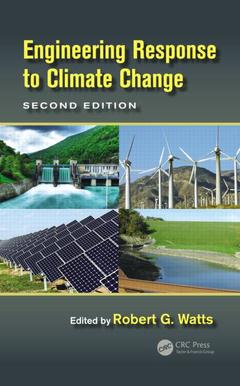Description
Engineering Response to Climate Change (2nd Ed.)
Coordinator: Watts Robert G.
Language: English
Subjects for Engineering Response to Climate Change:
Keywords
Energy Efficiency; Urban Heat Islands; light; Light Water Reactor; water; Energy Resources; reactor; Power Plants; inertial; Greenhouse Gases; fusion; Climate Change; energy; Spent Fuel; spend; Fusion Power Plant; fuel; Advanced Nuclear Energy Systems; power; IFE; plant; Chicago Climate Action Plan; Nuclear Energy Systems; OECD NEA; Water Resources Systems; Energy Conservation; Inertial Fusion; Ret Generation; Energy Savings; Climate Engineering; Gen Iv; Fission Fragments; Fusion Energy; MOX Fuel; Nuclear Power
Publication date: 04-2013
· 15.6x23.4 cm · Hardback
Publication date: 04-2017
· 15.6x23.4 cm · Paperback
Description
/li>Contents
/li>Readership
/li>Biography
/li>
A clear, concise discussion of today?s hottest topics in climate change, including adapting to climate change and geo-engineering to mitigate the effects of change, Engineering Response to Climate Change, Second Edition takes on the tough questions of what to do and offers real solutions to the practical problems caused by radical changes in the Earth?s climate. From energy consumption and carbon dioxide emissions reduction, to climate-altering technologies, this new edition explores the latest concerns such as acidification of the ocean, energy efficiency, transportation, space solar power, and future and emerging possibilities.
The editors set the stage by discussing the separate issues of the emissions of radiatively important atmospheric constituents, energy demand, energy supply, agriculture, water resources, coastal hazards, adaption strategies, and geo-engineering. They explain the difference between the natural and human drivers of climate change and describe how humans have influenced the global climate during past decades. Each chapter concludes with discussion questions, calculations, and possible research topics.
See What?s in the Second Edition:
- New conceptual tools and research necessary for problems associated with fossil fuels
- Cutting-edge topics such as adaption and geo-engineering
- The latest concerns such as acidification of the ocean, energy efficiency, transportation, and space solar power
- Solutions to problems caused by changes in the Earth?s climate
So much has changed in the 15 years since the publication of the first edition, that this is, in effect, a completely new book. However, the general theme is the same: the climate energy problem has become largely an engineering problem. With this in mind, the book explores what engineers can do to prevent, mitigate, or adapt to climate change.
Radiatively Important Atmospheric Constituents. Weather and Climate. Climate Change and the Energy Connection. Energy Use. Energy Efficiency. Future of Fossil Fuels. Future of Nuclear Fission. Renewable Energy. Transportation. Fusion. Materials. Scenarios for the Future of Energy Use. Coastal Issues and Sea Level. Water Resources. Agriculture and Biological Systems. Adapting to Climate Change. Climate Engineering-Impact Reducer or Suffer Inducer?




